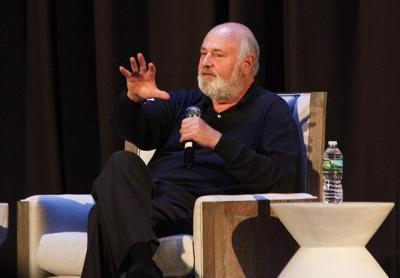Rob Reiner: ‘Nobody’s Listening’

“LBJ,” the Rob Reiner biopic that had its New York premiere at the Hamptons International Film Festival, is particularly meaningful and poignant in the context of the nation’s present political turmoil and spasms of gun violence. A powerful biography of Lyndon Johnson, the 36th president of the United States, who was thrust into the role by John F. Kennedy’s assassination in November 1963, it drew a long ovation at the Southampton Cinema on Saturday.
Mr. Reiner himself drew a capacity audience when he was interviewed at the East Hampton Middle School on Sunday. The actor and director, known for his starring role across eight seasons of “All in the Family” and for directing films including “This Is Spinal Tap,” “Stand by Me,” “The Princess Bride,” “When Harry Met Sally,” and “A Few Good Men,” was harshly critical of President Trump and repeatedly warned that the malevolent use of social media is “eating away at the fabric of democracy.”
Johnson, who is portrayed in “LBJ” by Woody Harrelson, was an immensely powerful lawmaker whose ambition and political acumen went hand in hand with a deep insecurity. Mr. Reiner’s biography is primarily focused on the years of Kennedy’s campaign and presidency, and the initial months following his assassination. As Kennedy’s vice president, Johnson walked a fine line, navigating ongoing tension between his Southern Democratic colleagues and the Northeastern, telegenic, Ivy League-educated Kennedy brothers they disdain.
With American military engagement in Southeast Asia growing along with the civil rights movement at home, Johnson had to battle and balance competing forces. Finally in the Oval Office, he opted to promote Kennedy’s legacy, pushing Congress toward adopting the Civil Rights Act over the strenuous objection of Southern legislators, notably Richard Russell Jr. of Georgia. “Wait till you see Woody Harrelson,” Mr. Reiner said of the actor’s portrayal of Johnson. “I hope he gets a nomination.”
Johnson, Mr. Reiner said, was “a very complex person.” While he was larger than life, “a tough Texan who would manipulate and browbeat people . . . he also had this incredibly insecure side to him. He was frightened a lot of times.”
Were it not for the Vietnam War, Johnson would rank among the greatest presidents in American history, Mr. Reiner said, citing domestic accomplishments like Medicare and Medicaid, the Civil Rights Act, the Voting Rights Act, and Head Start. Having said that, “you look at this film now in context of what a real president was able to accomplish and what that person in the White House is doing. I don’t even call him president, I don’t know what it is,” he said. “It’s like you’re in a nightmare that you can’t wake up from.”
For years, Mr. Trump advanced the lie that Barack Obama was not born in the United States, which Mr. Reiner called “a total racist attack on a really qualified, highly intelligent president — scandal-free, by the way.” Mr. Obama’s election, he said, was quickly followed by a backlash. Mr. Trump has unearthed “this incredible cancer that’s underneath this racism. It bubbles to the surface, he gives it a bullhorn, and we’re back, it seems, to where we were so many years ago, like we’re fighting the last battle of the Civil War.”
Mr. Reiner shunned social media until last year, when Mr. Trump’s rise compelled him to seek a platform. But “I’m really nervous about social media,” he said. “Look at what the Russians were able to do with Facebook and Twitter, and how they were able to push out actual fake news stories and poison our heads with propaganda. . . . I’m really scared about the capacity that social media has to change our way of thinking.”
The press, he added, is under attack by the president and conservatives. “It’s very hard for the public to determine what’s real and what’s fake. . . . If we don’t have a free and independent press to shine a light on what is actually fake, then we have the deterioration of democracy. That’s really scary.” This is the first time in our history, he said, “where we have been invaded and attacked from a foreign enemy, where we haven’t come together.”
Mr. Reiner recently launched investigaterussia.org, which describes itself as a resource to “help Americans recognize and understand the gravity of Russia’s continuing attacks on our democracy.”
“Nobody’s listening,” Mr. Reiner said of Russian interference in our elections, “because it doesn’t feel like anything happened,” but “this is insidious.”
His next film, “Shock and Awe,” also starring Mr. Harrelson, premiered on Sept. 30 at the Zurich Film Festival. “It’s about the run-up to the war in Iraq,” Mr. Reiner said, and was inspired by “Buying the War,” a PBS documentary by Bill Moyers, who had served as Johnson’s press secretary, about four journalists “who actually got it all right,” debunking the George W. Bush administration’s justifications for invading Iraq in the wake of the Sept. 11, 2001, terrorist attacks in New York and Washington. “Nobody was listening,” he said, “because people were caught up in the fervor of 9/11 and they bought the bill of goods that the Bush administration was pushing out.”
“The basis for democracy is a free and independent press,” he said. “And if we don’t have one and we don’t have an informed public, we’re going to be in trouble.”
